My previous blog
opened the door to questions about the universe and how it may have begun. Evidently this topic doesn't interest as many
readers as I thought, so I've decided to discontinue my planned series on this
subject. But I do want to hit a few major
points before I leave the topic.
Here is my
main point: Many people believe that science and the Bible are mutually exclusive,
i.e.you have to believe one or the other.
I believe that science and religion are not enemies, but actually support
each other. However it's necessary to consider many of the statements and stories
in the Bible metaphorically. That's not
to imply that the Bible is not the inspired word of God. I just mean that some things are not to be
taken literally. Jesus referred to himself
as "the door." Was that a literal description or a metaphor?
I pointed
out previously that there is no such thing as "settled science." Science constantly changes as more and more
information becomes available. So if
there appears to be a gap between science and the Bible, it could be a
misunderstanding of the scripture or perhaps lag time on the part of science to
fill the gap.
Let's
assume that the Big Bang Theory is basically correct. In the early 20th century, astronomer Edwin
Hubble applying the Doppler effect noted
that light from distant galaxies shifts toward the red end of the spectrum
indicating an expanding universe. He calculated that everything in the
universe, including matter, energy, space and even time itself, actually had a
beginning. Creation or the big bang didn't take place in time. Time began when there was matter and motion.
Stephen
Hawking, the most famous living scientist, in his book, "Grand
Design", says the laws of physics explain the creation of the universe. "Because there is a law such as gravity,
the universe can and will create itself out of nothing." But Dr. Francis Collins, head of the Genome
project, argues that gravity is "something," therefore gravity and
the laws of physics nullify Hawking's definition of "nothing." And how or by whom were the laws of physics
established?
Dr. John
Lennox, British scientist and mathematician,
in his book, "God and Stephen Hawking" says, "The laws of
physics can explain how the jet engine works, but not how it came to exist in
the first place."
I don't
want to sound like a preacher, but it is true that the universe had to either
have a creator or it must be explained by science. I want to consider some options.
Some
scientists believed that our universe
never had a beginning. They
believed that mass, space and energy had always existed in time, but the big
bang theory offered another option. The
term "big bang" was used sarcastically by British astronomer Sir Fred
Hoyle, who held tenaciously to the idea that the universe had always existed. But the
scientific evidence of a beginning became overwhelming.
Dr. George
Smoot, the Nobel Prize winning scientist who came up with the big bang theory
said that a parallel exists between the big bang theory and the Christian
notion of creation. Smoot was an
agnostic, so he was comfortable sitting on the fence. (metaphor)
It's
important to realize that science has its limitations and is not the only path
to knowledge and truth. Einstein said,
"Science without religion is lame. Religion without science is
blind." I said previously that
science and religion confirm each other but require an adequate understanding
of both.
So here are
some options:
Atheism eliminates
the possibility of a creator or a supreme intelligence behind the
universe. Stephen Hawking would be in
this category.
Agnosticism is not
sure about a Creator, like George Smoot.
Deism is the belief that God set the universe in
motion but does not interfere with how it runs.
This notion began in the 17th and 18th century and is common today. Thomas Jefferson was a deist.
Theism is the
belief that God created the universe.
The difference from deism is that God didn't stop there. He continues to
be involved in his creation and in the lives of human beings.
There are
subcategories to consider. There is the New
Earth position initiated by James Ussher, an Anglican Archbishop, who dated our
earth's age at roughly 6,000 years with six literal days of creation.
British
biologist Philip Goss, back in1857 tried
to explain the scientific evidence of an old earth with the idea that God
created the earth in six 24 hour days with the appearance of age. God just made it look old. But this implies
that God is a trickster.
Regarding
the old earth belief, many of the problems with the Genesis account can be
ameliorated if it is understood that there could be millions of years between
the first verse, "In the beginning God created the heavens and the earth,"
and the second verse and those describing the days of creation that follow. There are several theories about the order and
sequence of the days described as well.
Augustine
took "morning" and "evening" figuratively, for example. John
Lennox says that the Bible ". . . leaves the time of creation open."
I've tossed
out some ideas to think about. I know
that we'll never have all the answers, but, personally I find it impossible to
believe in design without a designer.


